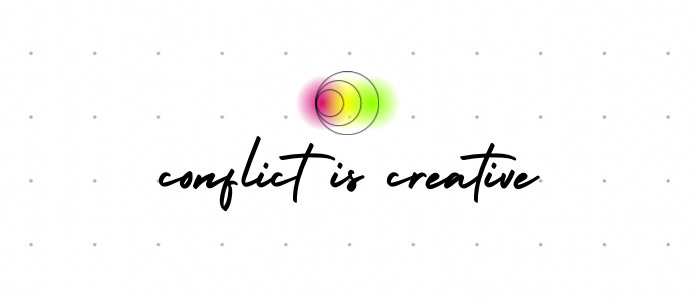We get stuck in trying to survive one another. All because we never learned how to disagree.
At the moment, I’m in the middle of facilitating a two-part training on conflict with managers at a fast-growing creative agency.
In session #1, we introduced a new way to think about conflict—not as a problem but as an inevitable and invaluable part of teamwork—and simple tools for fully leveraging it. Between sessions, they’ve been asked to apply what they’ve learned in the real-life conflicts they encounter at work and in life. In session #2 we’ll reflect on their early progress and explore strategies for coming to the most creative outcomes possible.
My favorite thing about facilitating this workshop is how much fun we have. That may be surprising given the topic and the fact that we open with a check-in that looks like:
However, the team is invited to see that conflict itself isn’t the problem. The problem is all the baggage we bring to it. Conflict can’t be constructive or creative (or fun!) when we:
Forget we’re on the same team: Sadly, it’s in our nature to revert to us/them dynamics when we encounter conflict, change or stress. Our brains sort people into in-group (with me) or out-group (against me) using arbitrary or surface-level information—appearance, language, opinion, etc.—but not accounting for the facts that we are more similar than different, that our interests are often aligned and that our differences make us smarter and stronger. Then there’s our tendency to…
Make it personal: Psychologists differentiate between task conflict (I disagree with you about this strategy) and relationship conflict (I don’t like who/how you are). The former is vital to any healthy and high-performing team. The latter is toxic. And it’s easy for task conflict to slip into relationship conflict when we…
Avoid addressing it: Most people think having a conflict is the worst thing that can happen in a relationship. I disagree. Not having a conflict out—that’s the worst thing. We think that if we ignore it, it’ll go away, but the opposite is true. A conflict that goes unaddressed only deepens and festers, creating cycles of blame and shame that keep us locked in fight-or-flight mode.
That’s how we get stuck in trying to survive one another. All because we never learned how to disagree.
We’ll talk plenty about conflict (and the tools we can use to leverage it) in this space. But lately, I’ve been thinking about one particular conflict we need to address. One that may not at first glance seem like a conflict at all.
It’s that phenomenon most recently known as “quiet quitting.”
I have thoughts on this subject, but I’m going to hold them for now. I’m more interested in what you think. Will you take 5 minutes to share your experience and perspective with me?
Your responses to a few questions will inform the next installment(s) of this newsletter, in which I’ll aim to reframe “quiet quitting” as a creative conflict.
Thanks in advance for your help!





